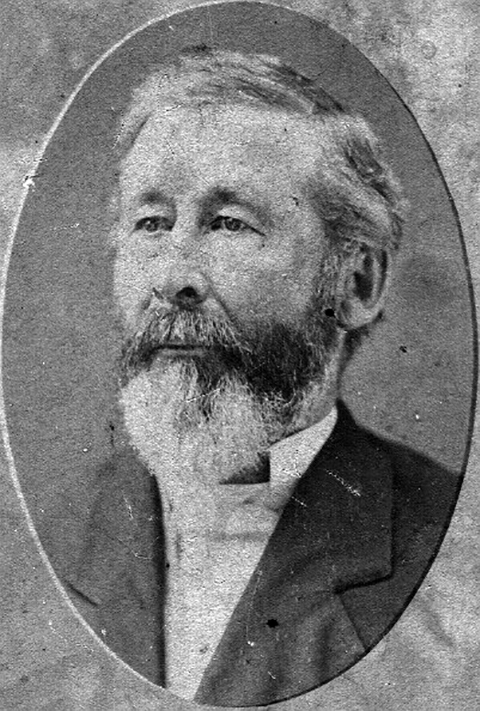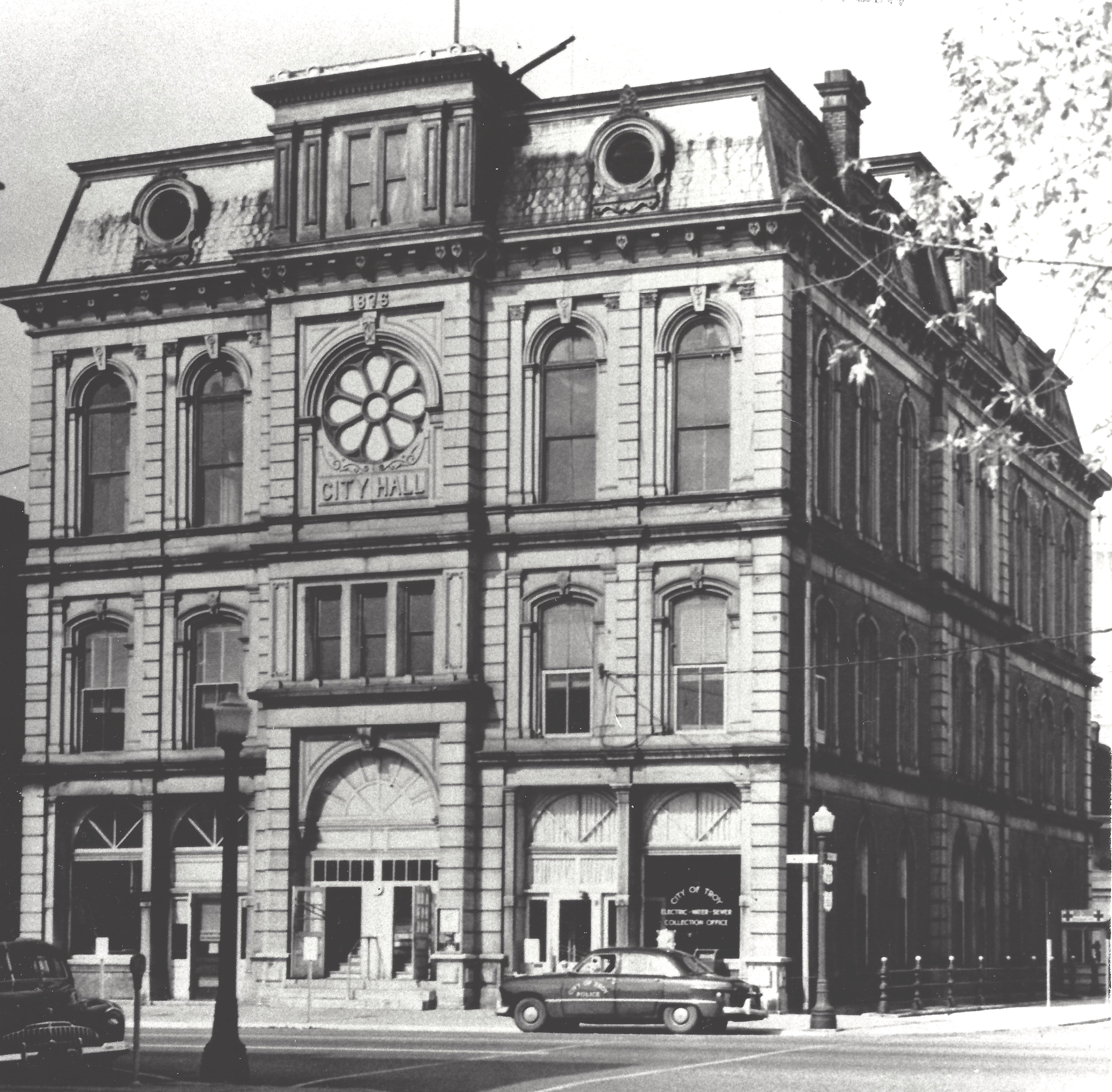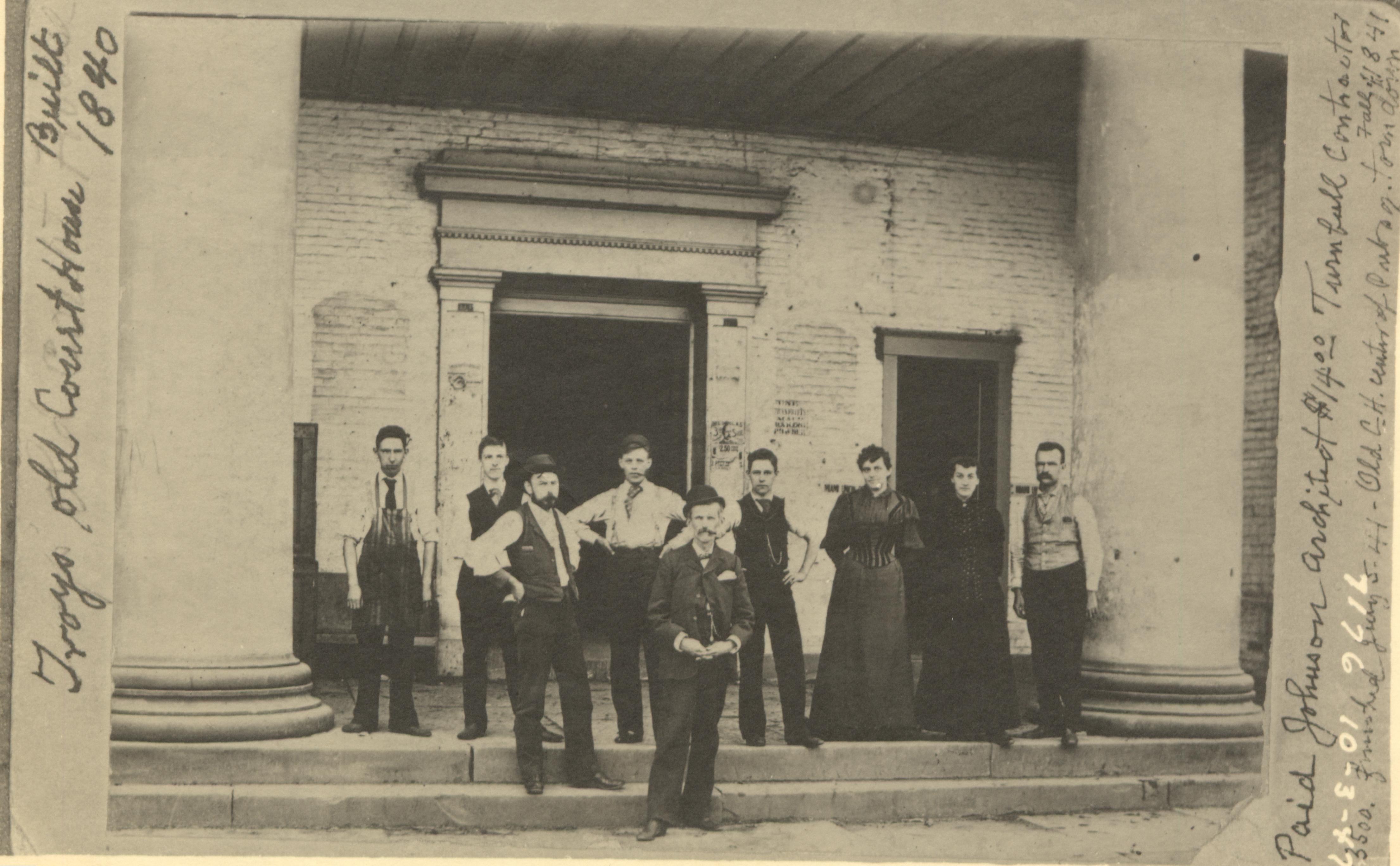Down through the history of the United States, many political party conventions have been held to select a candidate to run for the office of President of the United States. Thousands of men and women from across America have participated in the nomination process. In Troy, one 19th century convention delegate is still remembered: George Burgess.
 Burgess was a delegate to the Republican Party convention in 1860. There he had helped to nominate Illinois lawyer Abraham Lincoln as a candidate for President of the United States. Doing so was a highlight of his life.
Burgess was a delegate to the Republican Party convention in 1860. There he had helped to nominate Illinois lawyer Abraham Lincoln as a candidate for President of the United States. Doing so was a highlight of his life.
Burgess was not a native Trojan. He was born in Springfield, Vermont on April 4, 1817. He came to Ohio when he was about 17 to attend college in Marrietta. Just before his graduation, however, he became ill with measles and did not finish. In the spring of 1838—probably just after his recovery from measles—he came to Troy. Shortly thereafter, he began teaching boys in a private school in the basement of the old Episcopal Church. (The public school district did not exist at the time.) Some sources say that he began teaching in 1838; others 1839. Records do say that in 1839 he taught the first Troy school classes in algebra, geometry and Latin and that several of his students later became prominent Troy residents.
Burgess is believed to have taught for two years. About 1840 he began studying law in the office of a Judge Hart. He was admitted to the bar in 1840 and established a practice in Troy. Burgess was one of three attorneys who drew up the constitution for Troy’s first bank in 1847: The Miami County Branch Bank of the State of Ohio.
Not much is known about Burgess’ private life. He was first married to Hannah Hunt Temple. She died sometime during 1860-1861 (sources vary). His second wife was a Sidney school teacher named Mattie Crowell. He married Miss Crowell in 1865. Some sources say that he was the father of several children, but they are not named in either in his obituary or local history books.
His political life may have started in 1848 when he became the Miami County Recorder. He served for three years. In 1851, he became the Mayor of Troy. He served again in 1852 and 1866. In 1856, he gave a speech at a Republican campaign gathering near Pleasant Hill to support candidate John C. Fremont for President of the United States. This was in the early days of the Republican Party.
In September 1859, Burgess heard Abraham Lincoln speak in Dayton at the Montgomery County Courthouse. A few months later, he was selected by the Miami County Republican Party to be its representative at the 1860 convention in Chicago.
 The 1860 convention was held during May 16th to 18th at what is said to have been a temporary, wood framed building named the “Wigwam.” Though temporary, it was large enough to hold a crowd of 10,000 people. Burgess’ obituary says, “…it was always a matter of pride that he contributed as much as any other man, if not more, to the nomination of Abraham Lincoln (for President of the United States)”. (Miami Union newspaper, December 15, 1877. After Lincoln’s assassination in 1865, Burgess spoke at a memorial service for the President at the Presbyterian Church in Troy.
The 1860 convention was held during May 16th to 18th at what is said to have been a temporary, wood framed building named the “Wigwam.” Though temporary, it was large enough to hold a crowd of 10,000 people. Burgess’ obituary says, “…it was always a matter of pride that he contributed as much as any other man, if not more, to the nomination of Abraham Lincoln (for President of the United States)”. (Miami Union newspaper, December 15, 1877. After Lincoln’s assassination in 1865, Burgess spoke at a memorial service for the President at the Presbyterian Church in Troy.
Burgess was apparently a very good looking man. A caption under the photograph of his home in the book HISTORIC TROY OHIO by the Troy Historical Society says, “He was said to have been the most handsome man at the Republican Convention in 1860….” Another story mentions that he was “suave.” Historian Thomas Wheeler in his book TROY THE NINETEENTH CENTURY says that Burgess was a tall, handsome, and distinguished-looking man. Ironically, local historians have only found one photograph that is said to be Burgess. The photograph shows a man in his later years of life. Historians have not been able to confirm that the man in the photograph is Burgess.
George Burgess was involved in many important 19th century events in Troy. When the Troy Baseball League was organized in September of 1866, he was its first president. (At the beginning of the league, most of the players were over the age of 50 and none knew how to play the game.) When the Troy City Building (then the City Building and Opera House) was dedicated on March 12, 1877, Mayor M.B. Earnhart presented the building to the people of Troy. Burgess accepted the building on behalf of the citizens of Troy. On the 4th of July in 1877, a spectacular celebration was held in downtown Troy. Burgess is reported to have given a long speech as part of the festivities. (It is noted in Thomas Wheeler’s book that Burgess had once been a member of the local military organization Lafayette Blues.)
Old stories say that Burgess always wanted to be a judge. In 1877, he became a judge of the Miami County Common Pleas Court. He was first appointed to fill the unexpired term of Judge Robert C. Fulton. Then he was elected as Judge. His obituary says, “…it was the Judgeship that he coveted as his crowing ambition in life. Conscious of his ability to fill the position he frankly asked for it at the hands of his fellow-citizens. Further than this he would not go.” Unfortunately, he died within in months becoming a judge. Upon his death, the Miami Union newspaper (December 1, 1877) reported, “He had always been a robust man. He was a man of ability and culture. A year ago he attained to a position, for which he was well fitted and which he had long desired….”
 Trojans greatly mourned over Burgess’ death. Local writer Thomas Harbaugh wrote a poem honoring him titled “The Dead Judge.” It was published in the Miami Union newspaper on December 8, 1877. One verse reads:
Trojans greatly mourned over Burgess’ death. Local writer Thomas Harbaugh wrote a poem honoring him titled “The Dead Judge.” It was published in the Miami Union newspaper on December 8, 1877. One verse reads:
“The honored chair which he with honor fill’d
So vacant now, a lonely shadow throws;
The measured voice so often heard, is still’d—
The busy brain hath found repose!”
Though nearly 140 years have now passed since Burgess died, nevertheless, he is still remembered as the Trojan who helped Abraham Lincoln become President of the United States and the most handsome man at the 1860 Republican convention.
For further information about George Burgess, contact The Troy Historical Society at (937) 339-5900 or by email at This email address is being protected from spambots. You need JavaScript enabled to view it.. Information is also available at the Troy-Miami County Public Library Local History Library, 100 West Main Street, Troy, OH 45373.

